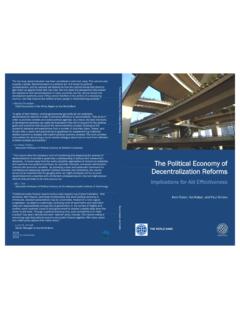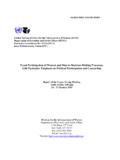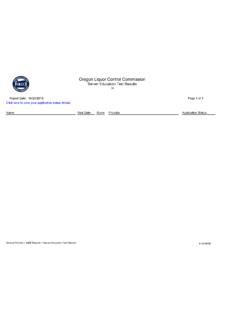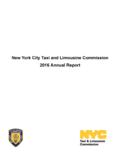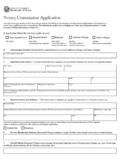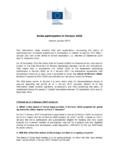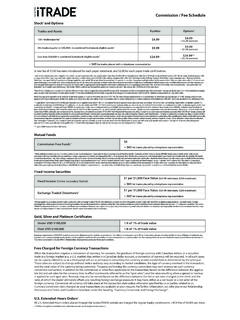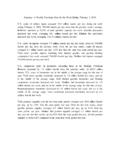Transcription of Higher Education in Nigeria: A Status Report - World Bank
1 Published in Higher Education Policy, 2003, 16, pp. 259-281. Higher Education in nigeria : A Status Report William Sainta,*, Teresa A. Hartnettb and Erich Strassnerc a The World Bank, 1818 H Street, , Washington , 20433 USA. b Division of Business & Finance, The University of Memphis, 371 Administration Bldg., Memphis, Tennessee,38152 USA. c Bureau of Economic Analysis, Department of Commerce, 1441 L Street NW (BE-51),Washington, ,20230 USA. ABSTRACT. The government of nigeria recently initiated Higher Education policy reforms intended to bring its university system more in line with international good practices. The reforms promote increased institutional autonomy, greater system differentiation, strengthened governance, and mechanisms for quality assurance. They seek to create a more flexible and responsive system of university teaching and research that, over time, will contribute increasingly to national innovation capacities, productivity gains, and economic growth.
2 This paper reports on the current Status of Higher Education in nigeria and reviews the country's new policy initiatives in this context. The discussion gives particular attention to issues of access, teaching/learning, finance, and governance/management. Keywords: Educational policy; Development; Higher Education ; nigeria _____. Introduction From a global perspective, economic and social development are increasingly driven by the advancement and application of knowledge. Education in general, and Higher Education in particular, are fundamental to the construction of a knowledge economy and society in all nations ( World BANK. 1999). Yet the potential of Higher Education systems in developing countries to fulfill this responsibility is frequently thwarted by long-standing problems of finance, efficiency, equity, quality and governance. Now, these old challenges have been augmented by new challenges linked to the growing role of knowledge in economic development, rapid changes in telecommunications technology, and the globalization of trade and labor markets (SALMI 2001).
3 *. Corresponding author. Tel.: 202-473-7578; fax: 202-473-8107. Email addresses: (W. Saint), (T. Hartnett), (E. Strassner). The findings, interpretations and conclusions expressed herein are entirely those of the authors and should not be attributed in any manner to the institutions that employ them, or to their governing boards or affiliated organizations. 1. Knowledge has become the most important factor for economic development in the 21st century. Through its capacity to augment productivity, it increasingly constitutes the foundation of a country's competitive advantage (PORTER 1990). This change is most evident in OECD countries, where investments in the intangibles that make up the knowledge base of a country ( , research and development, Higher Education , computer software, patents) are equaling or even exceeding investments in physical equipment (OECD 2001). Developing economies, while affected by these transformations, are not yet reaping their benefits.
4 This is because the capacity to generate and harness knowledge in the pursuit of sustainable development and improved living standards is not spread equally among nations. In 1996, OECD countries accounted for 85% of total R&D investment;. China, India, Brazil, and East Asia represented 11%; and the rest of the World only 4%. Advanced economies enjoy the fruits of a self-promoting cycle in which the benefits of research help produce the wealth and public support needed to enable continued investments in R&D (ROMER 1990). In contrast, many developing countries have neither articulated a development strategy linking knowledge to economic growth nor built up their capacity to do so. nigeria is one of these. Although it is Africa's largest country with 20 percent of the region's population, nigeria has only 15 scientists and engineers engaged in research and development per million persons. This compares with 168 in Brazil, 459 in China, 158 in India, and 4,103 in the United States ( World BANK 2002a:Table ).
5 What chance does nigeria have of participating in the emerging global knowledge economy? A. review of the country's past and present Higher Education policies may provide part of the answer. Following years of questionable Higher Education policies under various military administrations, recent initiatives by nigeria 's democratically elected government of Olusegun Obasanjo suggest policy movement in the right direction. This paper reports on the present condition of Higher Education in nigeria and assesses the new policy initiatives against this backdrop. It begins by providing an overview of the country and its Higher Education system. It then proposes a simple framework for identifying key issues and analyzes available data in this context. It concludes with a summary assessment and suggestions for further improving system performance. Country context With a population of 120 million and ample natural resources, nigeria is Africa's sleeping economic giant.
6 It is also a somewhat deformed giant. While one-third of its population pursues a life style oriented in various degrees towards Europe and North America, the other two-thirds struggles to 2. survive on less than one dollar per day ( World BANK 1996). Wrapped in a culture noted for industry, creativity and initiative, some Nigerians prefer to apply these talents to questionable or illicit pursuits, while many others expect government to provide the cure for their economic and social ills. Consequently, the country's business environment is distorted and restrictive. In spite of substantial oil revenues, per capita income is lower today than it was in 1970. The non-oil economy is stagnant. A survey of international businesses working in Sub-Saharan Africa found that nigeria is one of the most difficult countries in the World for private business (CENTER FOR INTERNATIONAL DEVELOPMENT. 2000). On balance, the material conditions for development appear to be available, but the human and cultural conditions that enable development to occur are not yet in place.
7 In recent years, the economic success of newly industrializing nations ( , the "Asian tigers") has been linked to substantial prior investment in human resources. These strategic investments, together with particular institutional and policy choices concerning the nature of the university system, the extent of intellectual property protection, the historical evolution of industrial R&D organization, and the division of labor between private industry, universities and government in R&D performance and funding combine to form what is called a national innovation system (NELSON 1993:9) Research suggests that public policy plays an important role in shaping national innovative capacity by determining human capital investments and creating incentives for innovation. Countries that have increased their innovative capacities have invested heavily in science and engineering Education , and also in promoting competition as the basis for innovation (STERN et al.)
8 2000:33). Does nigeria possess the necessary elements to develop a national innovation system? The facts are not encouraging. Available data indicate low levels of investment in research capacity and Education , and help to explain why the country's non-oil economy has remained consistently sluggish during a decade of international economic expansion. On the research side, nigeria 's number of scientific publications for 1995 was 711 significantly less than its output of 1,062 scientific publications in 1981 by a comparatively much smaller university system (TASK FORCE 2000). In contrast, scientific publications were 3,413 for South Africa, 14,883 for India, 310 for Indonesia, and 5,440 for Brazil (TASK FORCE 2000). The country's low research output probably reflects the low priority accorded to research and development by government decision-makers. For example, nigeria 's federal university system spends only of its budget on research (HARTNETT 2000).
9 3. For Education , nigeria spends an estimated of its GNP while Sub-Saharan Africa as a whole spends (HINCHLIFFE 2002; UNESCO 2000).1 In nigeria , primary Education enrolls 81% of the relevant age group and graduates 69% of these. Therefore just over half of all children complete primary school. School drop-out rates have been rising and educational standards have reportedly declined (ONWEH 1997). Secondary Education enrollments grew at roughly 10% yearly during the 1990s, but access remains constrained (less than half of secondary school age children attend school). and significant regional disparities in access are evident. Technical Education is substantially neglected by policymakers and oriented to the teaching of traditional hand skills that are often divorced from labor market requirements. Higher Education enrolls a very modest 4% of the relevant age cohort. This level compares poorly with economic competitors such as South Africa (17%) , India (7%), Indonesia (11%) and Brazil (12%) (TASK FORCE 2000).
10 The elements of a national innovation system are clearly not yet in place. In this, politics has played a part. Legacy of the military era Political interventions in the Higher Education system under a series of military governments imposed distortions and constraints on the system's development. By 1980, nigeria had established a well- regarded Higher Education system offering instruction at an international standard in a number of disciplinary areas. The universities of Ibadan and Ahmadu Bello, for example, earned global recognition for their research in tropical health and agriculture, respectively. Under successive military governments during the 1980s and 1990s, however, this sparkling reputation steadily tarnished. Acquiescing to the political pressures of social demand for access, the system was permitted to expand rapidly. Enrollments grew at an annual rates of 12 to 15 percent. Between 1980.




